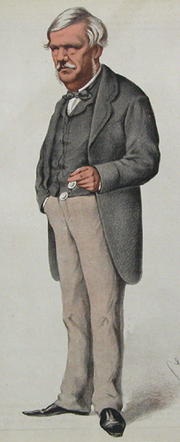John Laird Mair Lawrence
LordJohn Laird Mair Lawrence(1811 - 1879), 1st Baron of Punjab, GCB, GCSI, PC*, an Irishman who became the Governor-General of India, was the younger brother of Sir Henry Montgomery Lawrence. He was born on 4 March 1811 at Richmond, in Yorkshire, England, but he spent his early years in Derry, part of the Province of Ulster in the northern part of Ireland, and was educated at Foyle College (now Foyle and Londonderry College), where a statue of him, originally erected in Lahore, now stands. He was additionally educated at Bristol, Bath and Haileybury. In 1830, he took up an appointment under the East India Company and served from 1830-46 as a civilian administrator, as magistrate and as the Tax collector of Delhi. In 1846, he was appointed commissioner of the newly annexed Jalandhar Doab by Governor General Lord Hardinge. (Laird Mair-lit. Gaelic for Lord Mayor).
In 1849, he joined the Punjab Board of Administration as a member and, after its dissolution in 1853, became the Chief Commissioner of the Punjab. In comparison with his brother Henry Lawrence, John was a cold, practical administrator. He did not possess his brother's understanding or sympathy for the Sikhs and their institutions. He ruled with severity introducing several changes. Some of these changes appeared to be nothing more than 'vextatious innovations' to the general mass of the Sikh people who were already smarting under the shock of defeat and humiliation. John Lawrence also disbanded and dispersed the 92,000 strong Khalsa army. Its artillery was dismantled and carted away to Calcutta, and its ghorcharndas and jagirdar force was allowed to lapse.
In 1849, John Lawrence was nominated a member of the Board of Administration which Governor-General Lord Dalhousie had constituted to offset Henry Lawrence's influence in the Punjab. The Lawrence brothers sharply differed in their views on almost all political issues. Henry believed that the annexation of the Punjab was both unjust and impolitic, and that a policy of moderation and conciliation should be pursued towards the Sikhs. John was in favour of enforcing a more rigorous policy in the Punjab. The third member of the Board, diariest Greville Mansel, with his legal training, was interested more in the judicial aspects than in politics. The divergence of views in the Board led to its dissolution in 1853. This gave Lord Dalhousie the excuse to oust Henry Lawrence. John Lawrence became Chief Commissioner of the Punjab and inherited the powers of the Board. He did not possess his brother's genius for personal relations and for winning people's hearts, yet unfettered control over all departments allowed him to establish firmly the roots of British power in the Punjab. He divided the province into seven districts, pacified and settled the northwest frontier, improved agriculture, reduced landtax, and introduced the system of European learning and education in the Punjab.
In 1859, John Lawrence returned home and served as a member of Secretary of State's India Council till 1864, when he was appointed Viceroy and Governor-General of India (1864-69). He returned to England in 1869 and was bestowed with the title 'Baron Lawrence of the Punjab'.
He died on 26 June 1879.
His reforms of Punjab, included the abolition of internal duties, establishment of a common currency and postal system. He also encouraged the development of a Punjabi infrastructure, earned him, at least among the British, the sobriquet of "the Saviour of the Punjab".
Chivalric Titles awarded to 1st Baron Lawrence
- GCB-The Most Honourable Order of the Bath The Order of the Bath is the fourth-most senior of the British Orders of Chivalry.
- GCSI-The Most Exalted Order of the Star of India is an order of chivalry founded by Queen Victoria in 1861.
- PC- Her Majesty's Most Honourable Privy Council is a body of advisors to the British Sovereign.
References
1. Smith, Boswortb R., Life of I. ord Lawrence. London, 1885
2. Gibbon, Fredrick, P., The I.tiwrefire.`i of the Punjab. London, 1908
3. Trotter, L.J., Lord l.awrence. London, 1880
4. Temple, Richard, Lord Lawrence. London, 1890
5. Sinilh, Vincent, The Oxford History of India. Oxford, 1958

